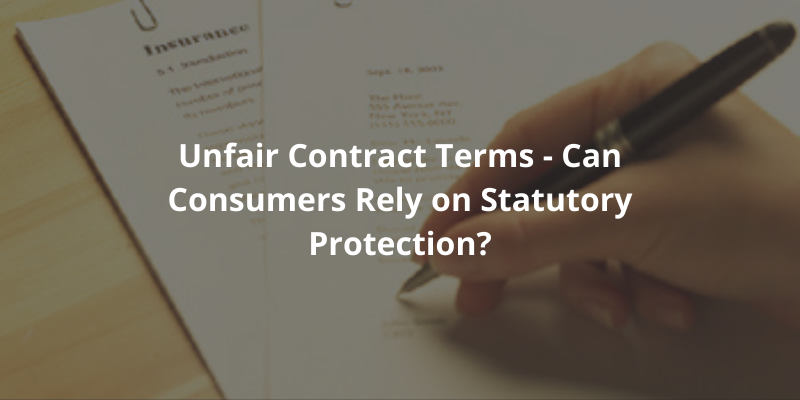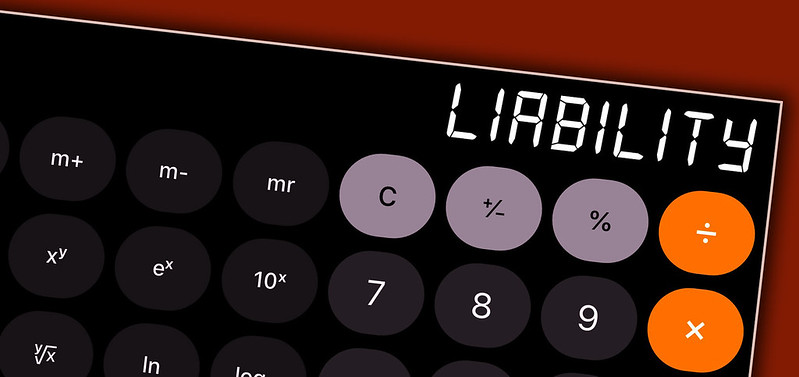Unfair Contract Terms: Understanding Consumer Protection under the Law
31 Jan 2023
16 Aug 2021
min read

What is an unfair contract term?
Consumers are generally provided with unfair contracts in relation to goods and services. The contract terms tend to be one-sided and in fine print. Most consumers do not care about these unfair contract terms until something blew up, in which case it is arguable whether these terms are enforceable. Unfair contract terms generally come in 2 forms - exclusion clause or limitation of liability clause.
A term or notice is unfair if, contrary to the requirement of good faith, it causes a significant imbalance in the party's rights and obligations under the contract to the detriment of the consumer; An unfair term is not binding on the consumer unless he/she chooses to rely on it.
While unfair terms can be a problem in both contracts between businesses and between businesses and consumers, it is undeniable that most consumers tend not to read the terms carefully, which may lead to contractual disputes.
In most common law jurisdictions, there are legislations to offer statutory protection for consumers against unfair contract terms (please see the table below). For the purposes of this article, consumer protection laws in the UK will be discussed in greater detail.
|
Jurisdiction |
Relevant legislation |
|
Australia:
|
Australian Consumer Law - Competition and Consumer Act 2010 (Cth) (CCA) (applicable to new contracts entered into on, or after 1 July 2010 and terms of existing contracts renewed or varied on or after 1 July 2010 |
|
Canada: British Columbia |
Business Practices and Consumer Protection Act |
|
Canada: Ontario |
Consumer Protection Act |
|
Hong Kong |
The Sale of Goods Ordinance The Supply of Services (Implied Terms) Ordinance |
|
Singapore |
Consumer Protection (Fair Trading) Act |
|
New Zealand |
Fair Trading Act |
|
United Kingdom |
Consumer Rights Act 2015 |
The main piece of legislation governing the relationship between businesses and consumers in the United Kingdom is the Consumer Rights Act 2015 (CRA), which protects consumers against traders. It covers all terms in the contract except the main subject matter, which has been made prominent and transparent. The Unfair Contract Terms Act 1977 (UCTA) still applies to non-consumer contracts.
In this article, we will be exploring the issue of unfair contract terms and discussing whether consumers’ own negligence or the inadequacy of current legislation should be at fault for the consequent problems caused by unfair contracts.

Is an exclusion clause/limitation of liability clause in a contract unfair?
An unfair contract generally involves an exclusion clause that exempts or limits the liability of a party in the event of a breach of contract. The questions to ask in relation in relation to whether an exclusion clause is effective are:
- Has the exclusion clause/limitation of liability clause been incorporated into the contract?
- Does the exclusion clause/limitation of liability clause effectively cover the breach?
- Does the unfair contract legislation (e.g. CRA and UCTA) apply to the exclusion clause?
Has the exclusion clause/limitation of liability clause been incorporated into the contract?
Generally, terms in standard form contracts between businesses and customers are incorporated either by signature or way of notice. A third way for terms to be incorporated is by custom.
By Signature
If a person signs the contract, case law has held that the terms will be binding, even if the person has not read them.
L’Estrange sets out the basic principle that consumers are bound by the terms of a contract they enter into by signature. It was reluctantly held that a consumer’s ignorance of the contents of the contract is immaterial to this rule unless there is fraud or misrepresentation. In this case, Mrs L’Estrange failed to read an exclusion clause that excluded the liability for the impairment of the machine. While it was held by the courts that Mrs L’Estrange was not entitled to a damages claim, given the CRA’s provisions on ensuring the satisfactory quality of the goods in question, such an issue was caused by the consumer’s failure to read the contract would have been eased.
By Notice
In contracts entered by way of notice, they will generally not be incorporated into the contract. The failure to read the contract is less of an issue. The party will need to actually know of the terms or be given sufficient notice of them before they can be incorporated.
In fact, It has been found that the ambiguity in the incorporation of certain onerous clauses in a contract, instead of the consumer’s negligence regarding scrutiny of the terms, has more often been a cause of improper agreement. For instance, O’Brien is a case that centres around the issues of a) whether a provision that provides discretion for the business (the newspaper) to decide the final winner is onerous or not and b) if so, whether the business has taken reasonable steps to bring the consumer’s attention to it. It was eventually held that Mr O’Brien’s claim was invalid. Regardless, the ambiguity in the definition of an onerous clause has proven that the main cause leading to the contractual dispute may not be that of the consumer’s negligence to read the terms but rather something more fundamentally related to the content of the contract.
Moreover, there are also ambiguities in the incorporation of exclusion clauses that may mislead even the consumers who have read the contracts, thereby obstructing the formation of a proper agreement between the parties.
In Thornton, the claimant did not read the exclusion clauses labelled on the pillars of the car park and was rejected by the defendant when seeking damages for his injury. Although the court eventually upheld his claim by ruling that the exclusion clause had not been incorporated into the contract, the case proves that even if consumers do scrutinise every term of a ‘contract’, the existence of non-incorporated, misleading terms will still prevent the parties from reaching a proper agreement.
By Custom
Where the parties have had previous dealings on the basis of an exclusion clause, the clause may be incorporated in later contracts if it can be shown that the party had actual knowledge of the exclusion clause.
In Hollier, although Mr Hollier did not read the exclusion clause on the forms he signed to Rambler Motors, the courts eventually upheld his claim against the latter as there were insufficient transactions to amount to a course of dealing that imports the written exclusion clause into later oral agreements. This again demonstrates that the consumers’ negligence is not the problematic component of the case but rather the incorporation of clauses.
These ambiguities regarding whether an exclusion clause is properly incorporated into the contract often render the non-legally proficient consumer in a disadvantaged position even if they had read the ‘contract’ as they would still be unsure as to which terms are binding.

Does the exclusion clause/limitation of liability clause effectively cover the breach?
The court generally tries to restrict the operations and effectiveness of exclusion/limitation of liability clauses through a number of rules:
Construction of the Clause
The court will determine whether the clause on its construction, covers what has occurred. An exclusion clause excludes all conditions, warranties and liabilities implied by law. Therefore if something is an express condition of the contract, then it will not be covered by the exclusion clause.
Contra Proferentum Rule
Any uncertainties or ambiguities in the exclusion clause are interpreted against the person seeking to rely on it.
Main Purpose Rule
An exclusion clause may be struck out if it is inconsistent with the purpose of the contract.
The doctrine of Fundamental Breach
One cannot exclude liability if a fundamental breach of the contract has occurred, i.e. the party in breach had failed altogether to perform the contract.
Does the unfair contract legislation (e.g. CRA and UCTA) apply to the exclusion clause?
The unfair contract legislation in most common law jurisdictions seek to restrict exclusion/limitation of liability clauses in the following ways:
- Negligence
- Breach of Contract
- Reasonableness
Negligence
Most unfair contract legislation prohibits the exclusion of liability for negligence that results in death or injury.
Breach of Contract
The exclusion clause in standard terms of business is not binding unless it is reasonable (see below). Generally, the implied terms relating to title, description, fitness, the satisfaction of quality etc., cannot be excluded.
Reasonableness
The concept of reasonableness is essential in all unfair contract legislation. The following factors will be considered by the court in the application of the reasonableness test:
- the bargaining powers of the respective parties;
- if any inducement was offered in return for the limitation of liability;
- whether the customer ought to know of the exemption;
- whether the goods and services were tailored made to the order of the customer.

Furthermore, the scope of assessment for the reasonableness of terms is still uncertain, which may leave much room for contractual disputes. This is a longstanding problem that has shown its impacts during the times when the UCTA was in force. In Abbey National, it is pronounced that part of a package of different ways of charging for a package of varied services should be considered as part of the price matter that is regulated by legislation and is therefore ruled in favour of Abbey National despite the attempt of many consumers in challenging the fairness of the terms. This vague phrasing of the regulatory scope of unfair terms inherited by CRA may leave loopholes for businesses to offer unequal bargains to consumers who inherently, have much less bargaining power in most cases (e.g. national bank vs ordinary citizen's average income). It was also said that charges amounting to over 30% of the revenue stream should reasonably be considered as part of the ‘essential bargain’, which is arguably tautological as it is not impossible for businesses to abuse the legal loophole to create unfair contracts tremendously lucrative for themselves.
In light of the above, Baroness Hale of the Supreme Court of the United Kingdom asserted that the legislature could have construed the directive regarding the assessment of ‘core terms’ (including price matter) more broadly which further reflected the potential problems that could arise under the uncertain scope of assessment of unfair terms. In addition to the fact that despite a contract containing an unfair term will continue to have effect in every other practicable respect. The uncertainty in the applicable scope of the CRA has allowed the unfairness of terms to remain a significant problem in reaching a proper agreement under standard form contracts that awaits remedies from the legislative level.
Conclusion
We have identified that while consumers’ non-vigilance may impede the establishment of a proper agreement between themselves and businesses, more often than not, the crux of the contractual disputes lies in the improper incorporation of terms, rendering the ignorance of consumers a legally irrelevant issue.
However, as consumers, it is still of paramount importance that we scrutinise our contracts carefully so that we can be clear of our own rights (and responsibilities), and minimise our risks of entering into unfair contracts.
Please note that this is a general summary of the position under common law and does not constitute legal advice. As the laws of each jurisdiction may be different, you may wish to consult your lawyer.
Keywords:

